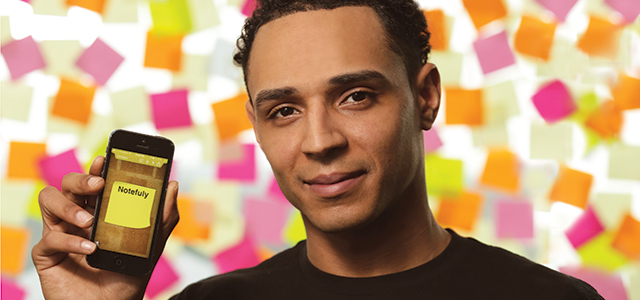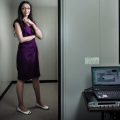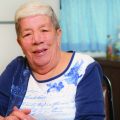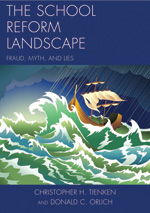Taseen Peterson was already a CEO when he enrolled in the Stillman School of Business’s undergraduate program in economics. His company, TapFactory, which he founded with his brother Mark in 2009, had found remarkable success with its flagship iPhone app, the note-taking and productivity app Notefuly. But 2014 proved to be Peterson’s biggest year yet.
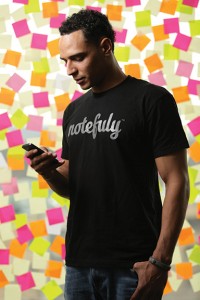
In March, Notefuly took first place in the 2013-14 Student Startup Madness contest at the South by Southwest Interactive Festival in Austin, Texas, topping a national field of 64 teams from 22 colleges and universities. Shortly thereafter, Inc. magazine named TapFactory one of the year’s Coolest College Startups. Word about Peterson and his company went viral: He was featured offering business advice to other young entrepreneurs in an Inc. profile; and Notefuly and TapFactory were featured in Business Insider and Investors Daily, among other business publications.
Peterson traces much of Notefuly’s recent success to mentorship he received at Stillman and its Center for Entrepreneurial Studies. From the start, the college senior has viewed his undergraduate education as more than just classwork. “The finance courses, the business courses have been great,” said Peterson, a David B. Gerstein Scholarship recipient. “But school for me has always been an opportunity to network, to grow myself and grow my business. It’s about making connections, building relationships.” Throughout his career, Peterson’s entrepreneurial achievement has come from his commitment to following his passions and taking advantage of every opportunity that arose.
How it all Began
In January 2007, Steve Jobs made a now-legendary speech introducing a little piece of hardware that he promised would change the way we interact with one another and the larger world. When the first iPhone was released six months later, Peterson and his brother, Mark, were among the tech-savvy early adopters who started developing their own software for the new device.
At the time, Taseen was working as a mortgage loan officer and had little thought of changing careers. “My brother and I had grown up around computers and were essentially self-taught,” he said. “We had no intention of turning it into a business; it was just a fascination — having fun, being creative, being curious, really.”
The idea for the Petersons’ first published app was sparked by everyday life: a new baby in the family inspired them to develop a kind of digital baby rattle.
“It had a terrible user interface,” Taseen recalled, “but it worked, and it made maybe $50 or $100 in the first month. And we thought, ‘Well, that was easy’ — not the creation, but once it was made, you just wait for people to download it. And after that we started brainstorming and coming up with ideas for other apps.”
Following the 2007-08 financial crisis, Peterson was already beginning to reassess his future in the real-estate industry, and now he and his brother turned more time and attention to developing apps. Within a few years, working with design partner Cameron Smith, their fledgling company developed the app that would become the award-winning Notefuly.
Three million downloads later, Peterson enrolled at Stillman with the aim of acquiring the skills and connections he needed to take TapFactory to the next level. In line with his commitment to networking and relationship-building, he found a mentor in Susan Scherreik, founding director of the Center for Entrepreneurial Studies. “We are working with one aspiring entrepreneur at a time, mentoring, helping them make connections, giving them the resources they need to meet their full potential,” Scherreik said. “The more we become an Internet society, the more in-person networking opportunities become important.”
In 2013, Scherreik suggested that Peterson enter the center’s annual venture-fund competition, Pirates Pitch. He took second place — a runner-up finish that proved to be a game-changer. “When Taseen didn’t win first place at Pirates Pitch, that was a motivator for him — he was determined to improve his performance, and he certainly did,” Scherreik said. “That’s a sign of someone with an entrepreneurial mindset: they see obstacles as opportunities.”
On Scherreik’s advice, Peterson entered the national Student Startup Madness competition, which asked student entrepreneurs to pitch their business ideas to a judging panel of business leaders, tech experts and investors. This time, Peterson was ready. He worked with a coach and spent weeks honing his presentation. The work paid off when the Notefuly team was awarded first place.
Today Peterson and his colleagues are working to translate their national recognition into business success, seeking out investors for TapFactory’s next steps. Downloads of Notefuly have surpassed 4 million, and the company is preparing to roll out cloud service for the app along with a major multiplatform upgrade. At the same time, TapFactory is expanding into Web design and development, digital consulting and creating software for wearable technology.
Peterson cites his time at Stillman as a key foundation upon which his business has grown. “Seton Hall is doing a great job of taking its entrepreneurial community to the next level — recognizing that we’re not just students but students with ideas, and providing us with mentorship and opportunities to gain insight, experience and exposure.”
Tricia Brick is a New York-area writer.

